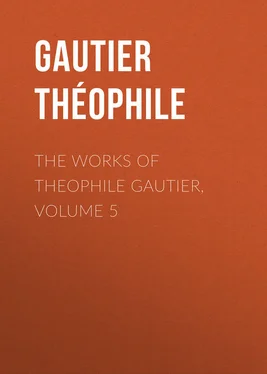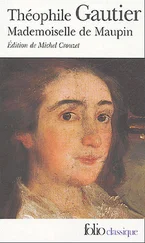Théophile Gautier - The Works of Theophile Gautier, Volume 5
Здесь есть возможность читать онлайн «Théophile Gautier - The Works of Theophile Gautier, Volume 5» — ознакомительный отрывок электронной книги совершенно бесплатно, а после прочтения отрывка купить полную версию. В некоторых случаях можно слушать аудио, скачать через торрент в формате fb2 и присутствует краткое содержание. Жанр: foreign_antique, foreign_prose, на английском языке. Описание произведения, (предисловие) а так же отзывы посетителей доступны на портале библиотеки ЛибКат.
- Название:The Works of Theophile Gautier, Volume 5
- Автор:
- Жанр:
- Год:неизвестен
- ISBN:нет данных
- Рейтинг книги:3 / 5. Голосов: 1
-
Избранное:Добавить в избранное
- Отзывы:
-
Ваша оценка:
- 60
- 1
- 2
- 3
- 4
- 5
The Works of Theophile Gautier, Volume 5: краткое содержание, описание и аннотация
Предлагаем к чтению аннотацию, описание, краткое содержание или предисловие (зависит от того, что написал сам автор книги «The Works of Theophile Gautier, Volume 5»). Если вы не нашли необходимую информацию о книге — напишите в комментариях, мы постараемся отыскать её.
The Works of Theophile Gautier, Volume 5 — читать онлайн ознакомительный отрывок
Ниже представлен текст книги, разбитый по страницам. Система сохранения места последней прочитанной страницы, позволяет с удобством читать онлайн бесплатно книгу «The Works of Theophile Gautier, Volume 5», без необходимости каждый раз заново искать на чём Вы остановились. Поставьте закладку, и сможете в любой момент перейти на страницу, на которой закончили чтение.
Интервал:
Закладка:
The operation having been at length completed – for the doctor wished not to scale off the gilding, – the box, resting on the ground, was separated into two parts like the casing of a cast, and the mummy appeared in all the brilliancy of its death toilet, coquettishly adorned as if it had wished to charm the genii of the subterranean realms. On opening the case, a faint, delightful, aromatic odour of cedar liquor, of sandal powder, of myrrh and cinnamon spread through the cabin of the vessel; for the body had not been gummed up and hardened with the black bitumen used in embalming the bodies of ordinary persons, and all the skill of the embalmers, the former inhabitants of Memnonia, seemed to have been directed to the preservation of these precious remains.
The head was enveloped in a network of narrow bands of fine linen, through which the face showed faintly. The essences in which they had been steeped had dyed the tissue a beautiful tawny tint. Over the breast a network of fine tubes of blue glass, very like the long jet beads which are used to embroider Spanish bodices, with little golden drops wherever the tubes crossed, fell down to the feet and formed a pearly shroud worthy of a queen. The statuettes of the four gods of Amenti in hammered gold shone brilliantly, and were symmetrically arranged along the upper edge of the network, which ended below in a fringe of most tasteful ornaments. Between the statuettes of the funeral gods was a golden plate, above which a lapis-lazuli scarabæus spread out its long golden wings. Under the mummy's head was placed a rich mirror of polished metal, as if it had been desired to give the dead soul an opportunity of beholding the spectre of its beauty during the long night of the tomb. By the mirror lay a coffer of enamelled ware, of most precious workmanship, which contained a necklace composed of ivory rings alternating with beads, gold, lapis-lazuli, and cornelian. By the side of the beauty had been placed also a narrow, square sandal-wood basin in which, during her lifetime, the dead woman had performed her perfumed ablutions. Three vases of wavy alabaster fastened to the bier, as was also the mummy, by a layer of natron, contained, the first two, essences, the scent of which could still be noticed, and the third, antimony powder and a small spatula for the purpose of colouring the edge of the eyelids and extending the outer angle according to the antique Egyptian usage, still practised at the present time by Eastern women.
"What a touching custom!" said Dr. Rumphius, excited by the sight of these treasures; "what a touching custom it was to bury with a young woman all her pretty toilet articles! For it is a young woman unquestionably that these linen bands, yellow with time and with essences, envelop. Compared with the Egyptians, we are downright barbarians; hurried on by our brutal way of living, we have lost the delicate sense of death. How much tenderness, how much regard, how much love do not these minute cares reveal, these infinite precautions, these useless caresses bestowed upon a senseless body, – that struggle to snatch from destruction an adored form and to restore it intact to the soul on the day of the supreme reunion!"
"Perhaps," replied Lord Evandale, very thoughtful, "our civilisation, which we think so highly developed, is, after all, but a great decadence which has lost even the historical remembrance of the gigantic societies which have disappeared. We are stupidly proud of a few ingenious pieces of mechanism which we have recently invented, and we forget the colossal splendours and the vast works impossible to any other nation, which are found in the ancient land of the Pharaohs. We have steam, but steam is less powerful than the force which built the Pyramids, dug out hypogea, carved mountains into the shapes of sphinxes and obelisks, sealed halls with one great stone which all our engines could not move, cut out monolithic chapels, and saved frail human remains from annihilation, – so deep a sense of eternity did it already possess."
"Oh, the Egyptians," said Dr. Rumphius, smiling, "were wonderful architects, amazing artists, and great scholars. A priest of Memphis and of Thebes could have taught even our German scholars; and as regards symbolism, they were greater than any symbolists of our day. But we shall succeed eventually in deciphering their hieroglyphs and penetrating their mysteries. The great Champollion has made out their alphabet; we shall easily read their granite books. Meanwhile, let us strip, as delicately as possible, this young beauty who is more than three thousand years of age."
"Poor woman!" murmured the young lord. "Profane eyes will now behold the mysterious charms which love itself perhaps never saw. Truly, under the empty pretext of scientific pursuit, we are as barbarous as the Persians of Cambyses, and if I were not afraid of driving to despair this worthy scholar, I should enclose you again, without having stripped off your last veil, within the triple box of your bier."
Dr. Rumphius raised from the casing the mummy, which was no heavier than a child's body, and began to unwrap it with motherly skill and lightness of touch. He first of all undid the outer envelope of linen, sewed together and impregnated with palm wine, and the broad bands which here and there girdled the body. Then he took hold of the end of a thin, narrow band, the infinite windings of which enclosed the limbs of the young Egyptian. He rolled up the band on itself as cleverly as the most skilful embalmer of the City of the Dead, following it up in all its meanderings and circumvolutions. As he progressed in his work, the mummy, freed from its envelope, like a statue which a sculptor blocks out of the marble, appeared more slender and exquisite in form. The bandage having been unrolled, another narrower one was seen, intended to bind the body more closely. It was of such fine linen, and so finely woven, that it was comparable to modern cambric and muslin. This bandage followed accurately every outline, imprisoning the fingers and the toes, moulding like a mask the features of the face, which was visible through the thin tissue. The aromatic balm in which it had been steeped had stiffened it, and as it came away under the fingers of the doctor, it gave out a little dry sound like that of paper that is being crushed or torn. There remained but one turn to be taken off, and familiar though he was with such work, Dr. Rumphius stopped for a moment, either through respect for the dead, or through that feeling which prevents a man from breaking open a letter, from opening a door, from raising a veil which hides a secret that he burns to learn. He ascribed his momentary pause to fatigue, and as a matter of fact, the perspiration was dripping from his forehead without his thinking of wiping it with his great blue-checked handkerchief; but fatigue had nothing to do with it. Meanwhile the dead form showed through the fine, gauze-like stuff, and some gold work shone faintly through it as well.
The last wrapping taken off, the young woman showed in the chaste nudity of her lovely form, preserving, in spite of so many centuries that had passed away, the fulness of her contours, and the easy grace of her pure lines. Her pose, an infrequent one in the case of mummies, was that of the Venus of Medici, as if the embalmers had wished to save this beautiful body from the set attitude of death and to soften the inflexible rigidity of the cadaver.
A cry of admiration was uttered at the same time by Rumphius and Evandale at the sight of the marvel. Never did a Greek or Roman statue present a more beautiful appearance. The peculiar characteristics of the Egyptian ideal gave indeed to this lovely body, so miraculously preserved, a slenderness and a grace lacking in antique marbles, – the long hands, the high-bred, narrow feet, the nails shining like agate, the slender waist, the shape of the breasts, small and turned up like a sandal beneath the veil which enveloped it, the slightly protruding contour of the hip, the roundness of the thigh, the somewhat long leg recalling the slender grace of the musicians and dancers represented on the frescoes of funeral repasts in the Thebes hypogea. It was a shape still childish in its gracefulness, yet possessing already all the perfections of a woman which Egyptian art expresses with such tender suavity, whether it paints the walls of the passages with a brush, or whether it patiently carves the hard basalt.
Читать дальшеИнтервал:
Закладка:
Похожие книги на «The Works of Theophile Gautier, Volume 5»
Представляем Вашему вниманию похожие книги на «The Works of Theophile Gautier, Volume 5» списком для выбора. Мы отобрали схожую по названию и смыслу литературу в надежде предоставить читателям больше вариантов отыскать новые, интересные, ещё непрочитанные произведения.
Обсуждение, отзывы о книге «The Works of Theophile Gautier, Volume 5» и просто собственные мнения читателей. Оставьте ваши комментарии, напишите, что Вы думаете о произведении, его смысле или главных героях. Укажите что конкретно понравилось, а что нет, и почему Вы так считаете.












